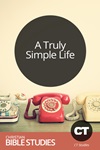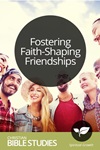Admit it: you want to be cool.
On your way home from work, canned ghetto-rage from a neighboring car pounds syncopated coolness through your windshield. Suddenly you feel uncool and you hate the feeling. So you lean back in your seat and put a meaner look on your face, in case the car-stereo guy glances over and sees you.
You go to a party, and you're greeted with songs that reduce you to a piece of meat. But nobody else seems to mind, so you don't leave, even when they start showing pornography on the big screen. After all, you don't want to look like you don't get it.
Maybe you buy magazines and listen to music you don't even like because you're afraid of being out of the loop. Maybe you ingratiate yourself to rude jerks because you want them to think you're cool. Maybe as a teenager you starved yourself skinny because it was the thing to do; and now as an adult it's no longer cool to hurt yourself, but you can't stop.
You know better than this; with your head you understand that this insecurity has no basis in reality. But your gut is way ahead of your mind on this one, driven by deeply rooted ghosts of shame, fear and loneliness.
Cool is all around us, saturating our culture. We can't escape it. Cool informs both our mundane activities and our significant decisions. It is an attitude, a habit, a worldview, a feeling. Sometimes we control cool, but sometimes it controls us. And sometimes, cool reduces us to extras in somebody else's fantasy—passers-by to whom he or she can feel superior.
Cool appears in myriad and contradictory forms.
- Teenage rebellion provokes the adult world's fears of irrelevance.
- The for-profit advertising world sells images of cool to exploit our insecurities.
- The jaded, cynical response to advertising, an anti-cool, ultimately is the same animal in a different hide.
- There's even cool Christianity: a resolute disassociation from embarrassing churches or older Christians.
I've been around cool my whole life, like just about everyone else in today's world, sometimes observing cool from a distance, and sometimes, in spite of myself, trying wholeheartedly to be cool. I was born in the western United States into a healthy family. Cool was not a value in my home, but authentic and courageous action most certainly was. My parents were young enough that by the time I wanted to be cool, they could remember cool's appeal and were able to uncover cool delusions for me.
When I was nine, my family left the United States for a seven-year missionary stint in Switzerland. There I lived an exciting urban life in a profoundly multiethnic world. We lived in the metropolis of Zurich during my adolescent years, before returning to the States in the early 1990s.
My relationship with cool was fairly standard through my early grades in school, which is to say I lived in it, near it and aware of it. Everything changed for me in an instant, however, midway through a chewing-out at the hands of my high school Latin teacher.
Nothing says "establishment" quite like Latin class, and at my school eight semesters were required. My friends and I were typical teenagers to Herr Roth, antagonizing him at every opportunity. One day I pushed him over the edge. When class was dismissed, he pulled me into the hallway. I was terrified, but with all the other kids walking by I needed to compose myself quickly. The man yelled at me for 20 minutes straight. I can only guess what he was saying— probably things like "You're wasting your life"—because I wasn't really listening. I was too busy demonstrating, via body language, that I didn't care how angry he was.
Then it happened. Suddenly I realized, I'm trying to be cool.
At that moment, I understood that cool doesn't reside in objects or people; it is a tool that can be wielded. Furthermore, I understood that this was an incredible and possibly dangerous secret to power and influence. More thought was needed, so I wiped the smirk off my face and let Herr Roth finish. It worked. He calmed down within seconds of feeling that he was being listened to.
It was as if scales had fallen out of my eyes. The entire world felt different. I could manipulate people with something as simple as body language—and I could just as easily be manipulated. On that day cool became a subject of my curiosity.
I've had my eyes wide open since that moment with Herr Roth. I have learned that cool is far more powerful than we realize, and that like the ring of power in J. R. Tolkien's Lord of the Rings, most of us don't have the mental strength to wield it. More often, cool wields us.
Cool is not innocent. Cool is the sunglasses we wear so people don't see that we're lonely, frightened or ashamed. It can alienate us from community, family and God. We're so attuned to cool that we can hardly imagine life without it.
To define is to limit
But what is cool anyway? For a passion so prominent in our hearts, we barely notice it, or think about it. We watch our tempers, we control our appetites, and we surrender our jealousies to God, but cool flies below our radar. Where did it come from? How does it affect our community? What does cool want? Is it merely a hangover from adolescence? Or is it something bigger?
One of the difficulties in defining cool is the word's near omnipresence in contemporary American English. We say "cool" as a generic term of approval. It can mean spontaneous, clever, slick, fashionable, high-tech, successful or original. Cool is a compliment; "That's cool," in fact, was the most common response people had when I told them I was writing this book.
In their book Cool Rules: Anatomy of an Attitude, Dick Pountain and David Robins supply a definition of cool: an attitude of permanent, private rebellion. I think this needs to he taken further. I define cool as the private performance of rebellion for rebellion's sake.
First of all, cool is private. It is individualistic from beginning to end, even when small groups of in-the-know insiders are involved; even in tight-knit cliques, membership is less about faithful friendship and looking out for each other, and more about excluding outsiders.
Second, cool is a performance. Cool exists to show off to an uncool audience. And since performance is always immediate, cool does not care about yesterday or tomorrow, only about right now.
Third, cool is about rebellion. Cool communicates categorical disrespect for authority. Cool accepts no limits on behavior and no limits on identity insisting instead on an individual authority to define oneself, and to know others without being known. That's why sunglasses are cool. They allow the wearers to look at the world without revealing who they are.
Finally cool's rebellion is for its own sake. There are many reasons that people rebel, from injustice to petty disagreements, but normal rebellion ends when the conflict is resolved. Not so with cool: cool shows universal contempt for authority extending across all space and time. Cool is never done being cool. Since this contempt for authority applies to traditional and current affairs alike, we can say that cool exists outside of time.
In the long run—the view from eternity—living only for the moment is less than shallow; it's inhuman. We are created for community, for family, for spiritual life, all of which relate to the past and the future. Real relationships extend backward in time (our memories) and forward into the future (our hopes and fears). Living for the moment is an obstacle to spiritual and social health. Basically whether pursued individually or collectively, cool is antisocial.
African American teenagers, white frat boys, gospel singers, athletes and French rioters can all embody mutually exclusive strains of cool but have a story in common: the private performance of rebellion for rebellion's sake. This story is important if we are to understand cool, since a person or group determined to be cool will shrug off attempts to understand them. In A Portrait of Dorian Gray, Oscar Wilde's Henry Wotton responds to a simple question—"What are you?"—in a decidedly 21st-century way: "To define is to limit." In other words, if you find out who I am, you might he able to call my bluff. The self-assured hipster may be revealed as a scared and lonely kid. The rebel without a cause may he exposed as a senseless car crash waiting to happen.
If we are going to live whole, healthy lives, we're going to have to step away from the shame and fear we hide behind cool. Authentic faith is uncool in the sense that it is unashamed. Christians are far richer than the empty bravado behind cool because our story is a great story: a God dies to give us life in abundance. And once we've begun to live uncool, our story will get ever sweeter.
The power of love
Cool contains enough contradictions and illusions to make one's head spin. But those after-party moments of honesty, when we know—really know—that we're lost and going nowhere, are moments of opportunity. Weakness, not success, is our way out. When we feel lonely and vulnerable—when we feel uncool— God is inviting us to a whole life. When we look around and ask "What am I doing with my life?" we can begin to live real lives.
We moved to Wisconsin while I was still in high school, and though I initially resisted—Wisconsin is far less cool than Zurich—I grew to enjoy the place, to the point where I am still here 14 years later, while the rest of my family has returned to our homeland in the intermountain American west.
I went to college in Madison, at the University of Wisconsin. This large Big Ten school is one of the country's most politically active, and is also one of the country's most debauched party schools. Study hard, party hard, the campus culture says. The UW is thus an easy place to figure yourself out, if you don't smoke your brains out first. I believe I chose the former.
In an environment dedicated to "ever encourage[ing] that fearless sifting and winnowing by which alone the truth can be found"—that's the motto of the UW—I discovered that Jesus' offer of "life to the full" (John 10:10) and Paul's message that it was "for freedom that Christ has set us free" (Gal. 5:1) were far more compelling and life giving than the cool culture around me. I found the beloved community of the church.
Here then is the crossroads we face: a cool moment, or a freeing, healthy life in Christ. We can't have both. The church's greatest power lies in its being the "beloved community—the supernatural community created by none other than God himself through his Spirit. God's love is the most deep-feeling, creative force in the universe, and the incredible truth is that this love lives in the church. In its sharing of Christ's suffering, and in its practice of inclusive hospitality, the beloved community displays cool's fundamental phoniness to the world. Cool in one corner, and the love God gives his followers in the other? It's not even a fair fight. The beloved community shatters cool's rebellion.
As God's people living out the full life Jesus promised, the freedom Paul claimed for us, the beloved community must escape the cult of cool. We're so used to pursuing cool that being uncool is scary. But what other honest option do we have? We have been given Jesus' words of life, and stewarding those words in a world suffering the effects of cool is a serious matter. Jesus proved his kingship by dying as a contemptible criminal. Following his example, we can and must die to ourselves. We must die to cool. But when we open our hearts for Christ's sake, we will live authentically: at the level of human suffering, as theologian Ray Aldred has said, because that is where God's power is greatest. The sooner we understand the impossibility of the church's being simultaneously cool and authentic, the better.
When we open our hearts for Christ's sake, we will gain authenticity. God calls us sons and daughters. He can protect us and make us whole. He can make us into a family. Christian love is vulnerability before God, which for all its uncoolness is the very substance of abundant life, love and worship.
Excerpted from Blessed Are the Uncool, by Paul Grant (IV Press), used with permission













